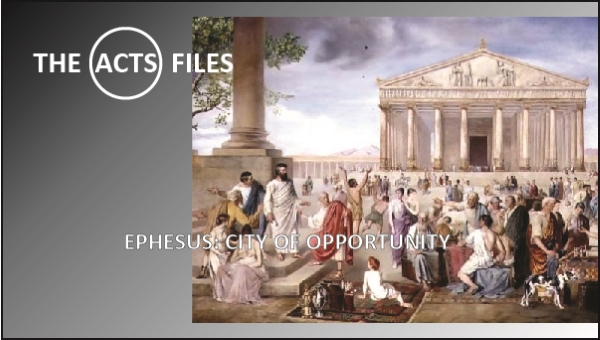By Tyson Thorne

Paul and Apollos probably passed each other on the road without knowing it. When Apollos set off for Corinth from Ephesus, Paul was heading to Ephesus on his third missionary journey. Upon his arrival Acts 19.1-.10) Paul found a group who were in the same position as Apollos had been in, that is they knew of Jesus only up until the time of the death of John the Baptist. These former disciples of John (of which there were a dozen) left Jerusalem and settled in Ephesus. Just as Aquilla and Priscila completed Apollos’ knowledge of the Messiah, so Paul took the disciples of John under his tutelage.
This particular case is an interesting one. Their Christian education was sorely lacking and in fact they had not placed their trust in Jesus as Messiah. Once they had done so, they immediately became indwelt by God’s Holy Spirit and began practicing the sign gifts of prophesy and speaking languages previously unknown to them. One has to wonder, why these two spiritual gifts?
While there are many sign gifts that testify to the authenticity of the message a believer speaks these two are often coupled, and 1 Corinthians 14 may explain why. In his first letter to the church of Corinth Paul addresses the usefulness of two sign gifts, the same pair mentioned here in Acts 19. In the chapter he teaches us that speaking in tongues is a sign to unbelievers while prophecy is for believers and not those without faith (verse 22). The disciples of John would encounter both types of people throughout their ministry and new life of faith.
After this encounter Paul went back to his previous practice of bringing Jesus into the local synagogue. For three months, Luke tells us, Paul debated the issue and convinced many. When he had worn out his welcome there and learned no others would follow, he left them and took his new disciples with him to another location where there might be instruction rather than debate. While we know that Paul started many house churches even in Ephesus, on this occasion a different type of structure would be used. For at least two years Paul used the lecture hall of Tyrrannus as a kind of daily church or school for all interested in learning about the Messiah.
Little is known about this lecture hall, and no archeological remains of it have yet been identified. While lecture halls were prevalent in Greece (every city had one), it is the name of this particular hall that is curious. Tyrrannus is Latin for “tyrant” and not a particularly common name. In fact throughout history only one person that we know of went by such a name, he was a sophist philosopher mentioned by the Suda (or Souda), a 10th century Byzantine encyclopedia. Possibly the hall had another formal name and was nicknamed “Tyrrannus” due to a previous lecturer. This would explain why no other references to this hall exist.
Besides its name this hall is notable for another reason. For the first time in history Christianity was regularly taught in a building that was neither a home nor a synagogue. Many Christians today don’t blink when presented with such a concept as we worship mostly in churches that do not double as a person’s home. In the first century AD however, and around 52-53 to be more precise, this was unheard of. While I appreciate very much the home-church movement that has spread successfully across much of the world the notion that home churches are the only right way to do church is refuted here. Clearly any building can be purposed for the teaching and edifying of Christ-followers. Furthermore, it is not only permissible to meet in a secular setting doing so had a tremendous impact (Acts 19.10).
|
|
|
